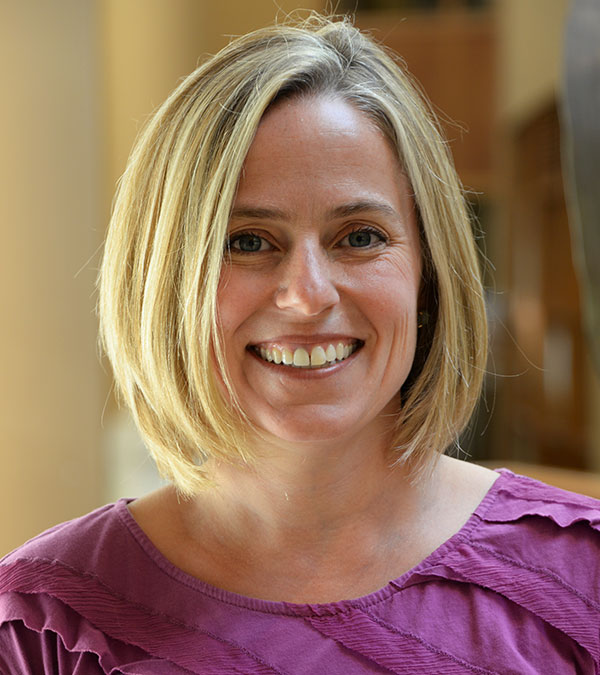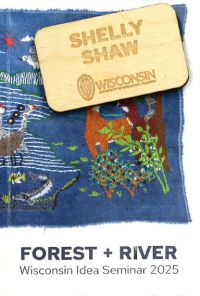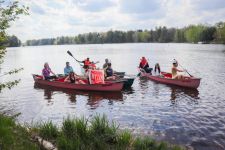
Shelly Shaw, MPH, joined 40 fellow UW faculty and staff to explore Wisconsin’s forests and rivers.
When a colleague recommended she apply for the Wisconsin Idea Seminar: Forest + River, Shelly Shaw, director of the University of Wisconsin Department of Family Medicine and Community Health Office of Community Health, agreed it sounded like a unique professional development opportunity. What unfolded over five days on a bus with 40 fellow UW faculty and staff turned out to be a transformative journey—one that deepened connections, broadened perspectives, and sparked new ideas for community engagement.
From early mornings to full days of travel and exploration, the group visited communities across the state—including Watertown, Stevens Point, Wausau, the Menominee Nation, and Milwaukee—staying in hotels and sharing stories along the way.
A Journey of Connection and Discovery
According to Shaw, the most powerful aspects of the seminar were the opportunities to connect with people across the state and on campus, as well as the inspiration to slow down and begin seeing Wisconsin through someone else’s lens.

The cover of the itinerary booklet features a photograph of Threaded Rivers, a story cloth by Edward Xiong, HMoob Paj Ntaub artist.
Whether it was walking through the lush tribal forest, listening to a local teenager sharing their healing journey, or engaging in heartfelt discussions with tribal elders and forestry experts, each moment offered a window into what matters most to Wisconsin’s communities.
“Never underestimate the power of conversation and collaboration,” Shaw said. “You saw that on display everywhere we went.”
A highlight of the trip was the visit to the Menominee Nation. “It was a privilege to walk in those forests, sit by the rivers and to learn from their community.”
The experience revealed a radically different approach to forestry—one that balances harvesting with sustainability. Unlike the clear-cutting seen elsewhere, the Menominee canopy tells a story of careful stewardship and cultural continuity. Spanning 217,000 commercial acres, the Menomonee Forest is managed by Menomonee Tribal Enterprises, which carefully considers shade tolerance, age distribution, and stand conditions to implement strategic harvesting practices that mimic natural forest processes.
Shaw was also impressed with the deep respect for cultural history. “They’re bringing back the language, preserving knowledge from elders. There’s so much to learn from that.”

Shelly Shaw, seated at the back of the canoe on the left, explores Legend Lake during a water workshop led by Marla Mahkimetas, a Menominee water educator and artist. Photo by Catherine Reiland/UW-Madison
Rivers, Research, and the Roots of Community
The seminar also explored the role of rivers in shaping Wisconsin’s communities and economies. Conversations with UW–Stevens Point faculty highlighted the power of community-engaged research—research that listens first, collaborates deeply, and centers local voices.
This principle resonated with Shaw’s work at DFMCH. “There were so many examples of food as medicine,” she noted. From Hmong elders sharing traditional meals to a Menominee mother-daughter duo launching a wellness business, the trip underscored how place, culture, and language are vital determinants of health.
Future Collaboration
The experience didn’t just inspire reflection—it sparked action. “It strengthened potential partnerships—like with the UW School of Veterinary Medicine or the Department of Psychiatry—and encouraged us to think beyond Dane County. How can we expand our reach?” The seminar planted seeds for new collaborations and a broader vision of community engagement.
If there’s one takeaway Shaw would share, it’s this: “It was inspiring. It gave me a lot of hope—seeing people leaning into their strengths, doing things that bring them joy, and offering different versions of health to their communities.” The seminar, she emphasized, is for everyone, regardless of their role at UW. “If you get the opportunity, take it. You’ll learn so much from others across campus and Wisconsin.”
The Wisconsin Idea Seminar is a five-day experience for UW–Madison faculty and staff to explore the cultural and social contexts of Wisconsin communities. Participants are selected through an application process. Held annually since 1985, it reflects the university’s commitment to public service, fostering partnerships that create solutions to improve lives across Wisconsin, the nation, and the world.
Published: July 2025
